形容词和副词(2)
形容词变副词 (2)

形容词变副词1. 什么是形容词和副词?在语法学中,形容词和副词是一类常见的词性,它们都属于修饰性词类。
形容词用来修饰名词或代词,描述它们的特征、性质或状态。
而副词则用来修饰动词、形容词或其他副词,表示时间、地点、描述方式、程度或目的等。
例如,在句子中,“美丽的花朵”中的“美丽”是形容词,用来修饰“花朵”;而在“她漂亮地唱歌”中的“漂亮地”中的“漂亮”则是一个副词,用来修饰“唱歌”的方式。
2. 形容词变副词的方法形容词变副词是通过简单地更改形容词的词尾或者添加特定的副词后缀来实现的。
下面将介绍一些常见的方法。
2.1. ‘-ly’ 后缀最常见的方法是在形容词结尾添加‘-ly’ 后缀。
这种形式特别适用于表示程度、方式和特定行为的副词。
例如: - quick(形容词,快)→ quickly(副词,快速地)- careful(形容词,小心的)→ carefully(副词,小心地) - loud(形容词,大声的)→ loudly(副词,大声地)需要注意的是,并非所有形容词都可以通过添加‘-ly’ 后缀变成副词。
一些形容词有其独特的变形方式。
2.2. 去除词尾的‘-e’ ,用‘-y’ 取代另一种常见的方法是去除形容词的词尾的‘e’ 并用‘y’ 取代它。
例如:- safe(形容词,安全的)→ safely(副词,安全地)- brave(形容词,勇敢的)→ bravely(副词,勇敢地) -wise(形容词,聪明的)→ wisely(副词,聪明地)这种方法特别适用于以辅音字母+’e’结尾的形容词。
2.3. 去除词尾的‘y’ ,用‘i’ 取代对于以‘y’ 结尾的形容词,可以去除‘y’ 并用‘i’ 取代。
例如: - happy(形容词,快乐的)→ happily(副词,快乐地) - easy(形容词,容易的)→ easily(副词,容易地) - busy(形容词,忙碌的)→ busily(副词,忙碌地)这个规则适用于以辅音+’y’结尾的形容词。
高职院校单独招生考试英语复习指导通用版第一部分基础知识梳理专题七形容词和副词

gh, enough等。例如:
Someone thinks it is hard to learn English. 有人认为学英语很难。
You should work hard. 你应该努力工作。
典例剖析
1. What a
cough! You seem C ill.
A. terribly; terribly B. terrible; terrible C. terrible; terribly
形容词和副词
复习指南
命题探究
考题中对形容词、副词的考查,其考点主要分为以下三类: (1)形容词、副词在具体语境中的正确使用。 (2)形容词、副词比较级、最高级的变化规则、用法及固定搭配。 (3)同义词、近义词和易混词的词义辨析。
考点一 形容词的基本用法
1.形容词的句法功能
(1)作定语:说明名词的性质和特征,通常置于名词之前。但是当形容词修饰不定代词 (如something, anything等)作定语时,要后置。例如:
考点三 易混形容词和副词辨析
2.易混副词辨析 (11)also,too,as well和either。
考点三 易混形容词和副词辨析
2.易混副词辨析 (12)how long,how soon,how often和how far。
考点三 易混形容词和副词辨析
2.易混副词辨析 (13)too...to和...enough to。
busy—busily; happy—happily; heavy—heavily
③ 以e
ly。特殊情况要去掉e
ly y。例如:
wide—widely; brave—bravely; true—truly; terrible—terribly
副词与形容词的区别

副词与形容词的区别副词与形容词的区别(1)形容词可以以同样的意义做谓语,可以再加程度副词,有时还可做补语,副词不能。
如:A事情的发生很偶然?B这件事发生得太突然了。
"A中的"偶然"不能换成"偶尔"。
B中的"突然"不能换成"忽然"。
可见,"偶尔"、"忽然"是副词,"偶然"、"突然"·是形容词。
(2)形容词还可以以同样的意义修饰各词,副词不能。
例:c·突然事件,d·必然结果。
其中的"突然"不能换成"忽然","必然"不能换成“必定”或“必须”等。
(3)“白、老、净、怪、偏、直、硬”等,虽然既可做谓语义可做定语,也可做状语,但它们做谓语或定语时同做状语时,不能保持意义上的一致,试比较:“白的墙”和“白跑一趟”,“黄瓜老了”和“他老跑北京”,“道路很直”和“眼皮直跳”。
不难看出,每组词语中的两个“白”或两个“老”、“直”等,在意义上毫无联系,它们只是采用了同样的语音形式和书写形式而已,可见,放在动词和形容词前的“白、老、净、怪、偏、直、硬”等是副词。
副词和动词的区别(1)副词只做状语,而能做状语的动词还能做谓语并且意义不变。
如:“他连续工作了十小时”,其中的“连续”只做状语,而“继续”一词在“他们继续赶路”一句中做状语,在“你来继续我们的事业”一句中则做谓语(述语中心语),可见“继续”是动词。
(2)“没有”和“没”比较特殊,它们在动词和形容词前是副词做状语,否定行为、性状的发生,如“没有去”、“没有红”,“没去”、“没红”;在名词前是动词,带宾语,否定事物的存在或否定事物的领有,如“没有书”、“没书”。
副词与时间名词的区别时间名词可以做主语,还可以同介词组合成介词短语(词组),如“从前是什么样子?”“在过去”、“从过去到现在”。
英语语法形容词和副词

5)句子中有助动词或be动词时,副词一般位 于助动词或be动词之后。如: The visitors have just arrived. 这些游客已经到达了。 The bus is always crowded. 车里总是拥挤的。
Exercise
2)形容词用在系动词之后,名词+系动词+形
容词,如: These flowers are red.这些花是红色的。(形 容词red在句中放在系动词be之后。) Bob looks smart today.今天鲍勃看上去很精神。
3 形容词用在不定代词后面。 Cathy found something strange in the magic box. 凯西在魔盒里发现了奇怪的东西。
much
副词的用法
(1)副词修饰动词时,通常位于被修饰动词
的后面。如: We should study hard.我们应该努力学习。 You walk too fast.你走得太快了。
(2)副词修饰形容词时,通常放在形容词
的前面。如: The boy is too young to go to school.那个 小孩子太小,不能去 上学。 Mark Twin is a very funny man.马克吐温是 一个非常有趣的人。
1) My father( ). A、works hard B、hard works C、work hardly 2) The dress is( ). A、beautiful quite B、quite beautiful C、quite beauty 3)Tom speaks English( ). A、well so B、well very C、so well 4)I ( )him speak English. A、often hear B、hear often C、hear usually 5)She ( )beautiful. A、so is B、is very C、very is
语法 第七章 形容词副词

代表表示国籍、地区、出处的形容词(或名词),如English,American,mountain等.
“材”
则代表形成中心名词的材料的形容词,如stone,wooden,silk,plastic等.
2.形容词的位置
例如: 1.a fine old stone bridge 一座古老的漂亮的石桥
The thinner I am, the happier I feel.
我越瘦,我感觉越快乐。 6.比较级+and+比较级 越来越…
She gets more and more beautiful every time I see her.
每次我见到她,都发现她越来越漂亮了。
7. the+比较级(+of+the+two+名词) 两者中较……的那一个
4.形容词比较级和最高级的构成
一 般 加 er 或 est
二 般 以字母 e 结尾,直接加 r 或 st
strange wide safe
三般
以辅音字母+元音字母+辅音字母结尾, 双写尾字母加 er 或d
四 般 以“辅音字母+y”结尾,变y为i,再加er或est
busy lazy happy angry hungry lucky lovely
9
1.形容词的用法
(5)“the+形容词”表示一类人。 例如:
The old and the young do not always understand each other.
老年人和年轻人并非总能相互理解。
10
1.形容词的用法
(5)“the+形容词”表示一类人。 例如:
形容词和副词的区别与用法
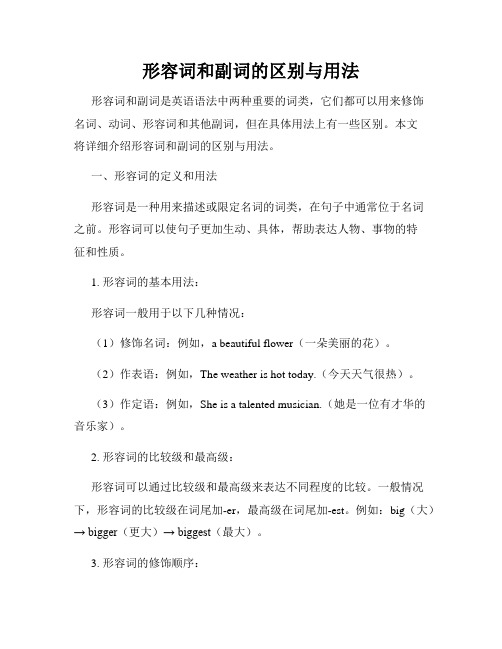
形容词和副词的区别与用法形容词和副词是英语语法中两种重要的词类,它们都可以用来修饰名词、动词、形容词和其他副词,但在具体用法上有一些区别。
本文将详细介绍形容词和副词的区别与用法。
一、形容词的定义和用法形容词是一种用来描述或限定名词的词类,在句子中通常位于名词之前。
形容词可以使句子更加生动、具体,帮助表达人物、事物的特征和性质。
1. 形容词的基本用法:形容词一般用于以下几种情况:(1)修饰名词:例如,a beautiful flower(一朵美丽的花)。
(2)作表语:例如,The weather is hot today.(今天天气很热)。
(3)作定语:例如,She is a talented musician.(她是一位有才华的音乐家)。
2. 形容词的比较级和最高级:形容词可以通过比较级和最高级来表达不同程度的比较。
一般情况下,形容词的比较级在词尾加-er,最高级在词尾加-est。
例如:big(大)→ bigger(更大)→ biggest(最大)。
3. 形容词的修饰顺序:多个形容词修饰同一个名词时,它们的顺序是有规律的。
通常,形容词的顺序是:冠词、观点或态度、大小、形状、年龄、颜色、国籍或来源、材料或用途、类别等。
例如:a beautiful small round glass bowl (一只漂亮的小圆玻璃碗)。
二、副词的定义和用法副词是一种用来修饰动词、形容词、其他副词和整个句子的词类,用来表达时间、地点、方式、程度等概念。
1. 副词的基本用法:副词可以用于以下几种情况:(1)修饰动词:例如,She sings beautifully.(她唱得很好听)。
(2)修饰形容词:例如,The movie is extremely interesting.(这部电影非常有趣)。
(3)修饰其他副词:例如,He speaks very slowly.(他说话非常慢)。
2. 副词的比较级和最高级:和形容词类似,副词也可以通过比较级和最高级来表达不同程度的比较。
形容词与副词的用法

形容词与副词的用法形容词(Adjective)和副词(Adverb)是英语中常见的词性,它们在句子中扮演着重要的角色。
形容词用来修饰名词,描述名词的性质或特征,而副词则用来修饰动词、形容词、副词等,并给出更详细的说明。
本文将从不同的角度探讨这两个词性在句子中的用法。
1. 形容词的用法形容词常用于以下几种情况:(1) 修饰名词形容词可以修饰名词,起到描述名词特征的作用。
例如:- 美丽的花朵在花园中怒放。
- 这个小男孩很聪明。
(2) 构成比较级和最高级形容词可以用来表示比较级和最高级。
在比较级中,我们通常在形容词后加上-er,而在最高级中加上-est,或者在形容词前加上more和most。
例如:- 这本书比那本书更有趣。
- 这是我见过的最美丽的风景。
(3) 作表语形容词可以用作表语,与主语连系动词一起说明主语的特征或状态。
例如:- 这个问题很困难。
- 我很高兴。
2. 副词的用法副词常用于以下几种情况:(1) 修饰动词副词可以修饰动词,表示动作的方式、程度等。
例如:- 他慢慢地走过了街道。
- 她轻轻地打开了门。
(2) 修饰形容词和副词副词也可以修饰形容词和副词,表示程度或者方式。
例如:- 这个女孩非常漂亮。
- 他们跑得很快。
(3) 修饰整个句子副词有时可以修饰整个句子,表示说话人的态度、观点或推测。
例如:- 显然,他是个天才。
- 或许,我们会成功。
总结:形容词和副词在英语句子中的用法多种多样,灵活运用它们可以使句子更加生动、精确。
形容词用来修饰名词,描述名词的性质或特征;而副词则用来修饰动词、形容词、副词等,并给出更详细的说明。
在写作中,我们应该注意正确使用形容词和副词,使句子表达更加准确、丰富。
形容词和副词的用法归纳
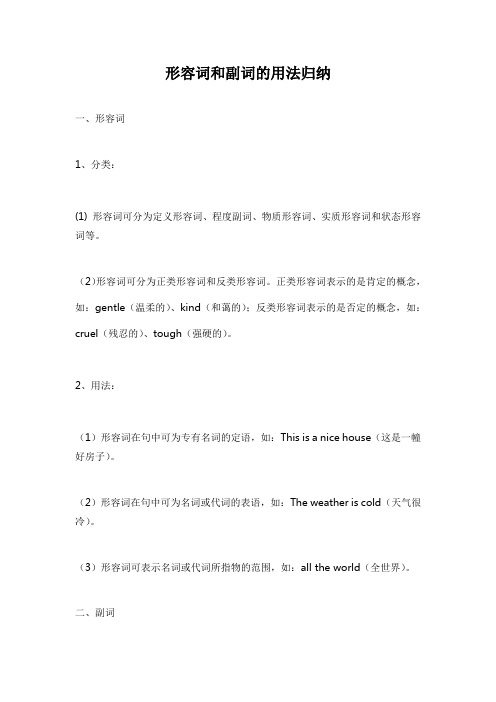
形容词和副词的用法归纳
一、形容词
1、分类:
(1) 形容词可分为定义形容词、程度副词、物质形容词、实质形容词和状态形容词等。
(2)形容词可分为正类形容词和反类形容词。
正类形容词表示的是肯定的概念,如:gentle(温柔的)、kind(和蔼的);反类形容词表示的是否定的概念,如:cruel(残忍的)、tough(强硬的)。
2、用法:
(1)形容词在句中可为专有名词的定语,如:This is a nice house(这是一幢好房子)。
(2)形容词在句中可为名词或代词的表语,如:The weather is cold(天气很冷)。
(3)形容词可表示名词或代词所指物的范围,如:all the world(全世界)。
二、副词
1、分类:
副词可分为时间副词、频率副词、程度副词、状语副词、方向副词、比较副词等。
2、用法:
(1)副词可修饰动词,如:They often go to school together(他们经常一起去上学)。
(2)副词可修饰形容词或其他副词,如:The sky is so beautiful(天空是如此美丽)。
(3)副词可修饰从句,如:He never believed that(他从不相信那件事)。
形容词和副词讲解和习题练习(含答案)[2]
![形容词和副词讲解和习题练习(含答案)[2]](https://img.taocdn.com/s3/m/5f0fb2ce453610661fd9f40b.png)
形容词和副词讲解和习题练习(含答案)(word版可编辑修改)编辑整理:尊敬的读者朋友们:这里是精品文档编辑中心,本文档内容是由我和我的同事精心编辑整理后发布的,发布之前我们对文中内容进行仔细校对,但是难免会有疏漏的地方,但是任然希望(形容词和副词讲解和习题练习(含答案)(word版可编辑修改))的内容能够给您的工作和学习带来便利。
同时也真诚的希望收到您的建议和反馈,这将是我们进步的源泉,前进的动力。
本文可编辑可修改,如果觉得对您有帮助请收藏以便随时查阅,最后祝您生活愉快业绩进步,以下为形容词和副词讲解和习题练习(含答案)(word版可编辑修改)的全部内容。
高中英语-—形容词和副词一、考点、热点回顾形容词1、形容词的一般用法(1)。
作定语,一般放在所修饰词的前面。
It’s a cold and windy day。
(2.)作表语,放在系动词的后面。
(look, feel, smell, sound…。
)He looks happy today.(3.)形容词修饰something,anything,nothing,everything等复合不定代词时,须放在其后。
Would you like something hot to drink?(4。
)表示长、宽、高、深及年龄的形容词,应放在相应的名词之后。
How long is the river? It’s about two hundred metres long.(5。
)只能作表语的形容词:afraid;alone;asleep;awake;alive;well健康的;ill;frightened The man is ill。
(正)The ill man is my uncle。
(误)(6。
)只能作定语的形容词:little小的;only唯一的;wooden木质的;woolen羊毛质的;elder年长的My elder brother is in Beijing。
形容词与副词
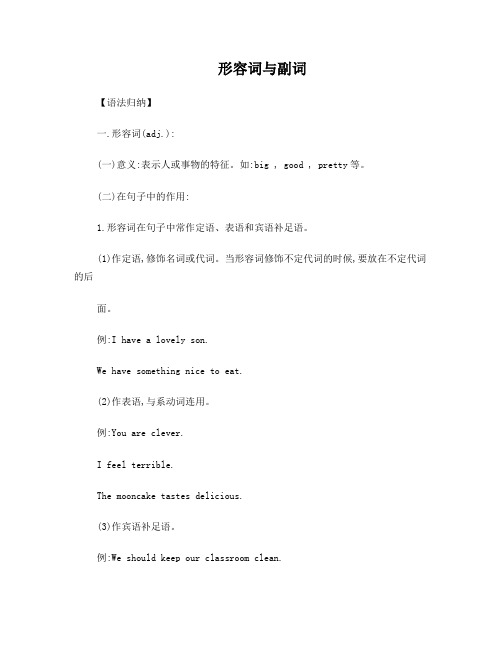
形容词与副词【语法归纳】一.形容词(adj.):(一)意义:表示人或事物的特征。
如:big , good , pretty等。
(二)在句子中的作用:1.形容词在句子中常作定语、表语和宾语补足语。
(1)作定语,修饰名词或代词。
当形容词修饰不定代词的时候,要放在不定代词的后面。
例:I have a lovely son.We have something nice to eat.(2)作表语,与系动词连用。
例:You are clever.I feel terrible.The mooncake tastes delicious.(3)作宾语补足语。
例:We should keep our classroom clean.2.特殊的形容词:(1)ill和well表示身体健康的时候,只能作表语,不作定语。
例:The boy was ill .不能说:He was an ill boy.The girl looks very well.不能说:She is a well girl.(2)以ly结尾的形容词,不要认为是副词。
如:friendly, lonely , lively二.副词(adv.)(一)意义:(修饰动词、形容词或其他副词)表示时间、地点、方法或程度等。
如:very , quite , slowly等。
(二)种类:1. 时间副词:now, then, ago , tomorrow2. 地点副词:here, there, outside, everywhere3. 方式副词:slowly, happily, angrily4.程度副词:almost, hardly, nearly5.疑问副词:how, why, where, when6.频度副词:always, often , usually(三)副词在句子中的位置:一般情况下,时间副词和地点副词的位置通常在句末,二者同时出现时,先地点后时间。
6-形容词和副词2

high
tall quiet 2. 原级 fine late nice large
3、
big --bigger --biggest hot --hotter--hottest
thin –- thinner --thinnest 4、
easy happy busy easier happier busier earlier more carefully
She is five years old . The rich should help the poor .
4.与the连用,表示某类人或物
表示长、宽、高、深和年龄的形容词, 应放在相应的名词之后.e.g. He is six years old. The river is 200 meters long. The tree is 20 meters tall.
Is there anything interesting in today’s newspaper ?
(3). 做宾语补足语,常用在下面动词后:keep, make, find, feel, think 等等。常见的句型有: keep sth. +adj. We should keep the windows open to let the fresh air in. make sb.+adj.
1.放be,seem,look,get 等连 系动词后作表语
2.放在宾语后作宾语补足语 3.作定语,放在修饰的名词前
4.作定语,放在不定代词之后 I have something important to tell you.
deep, long, high, tall, away, wide作定语Байду номын сангаас放在名词之后
知识点形容词与副词总结
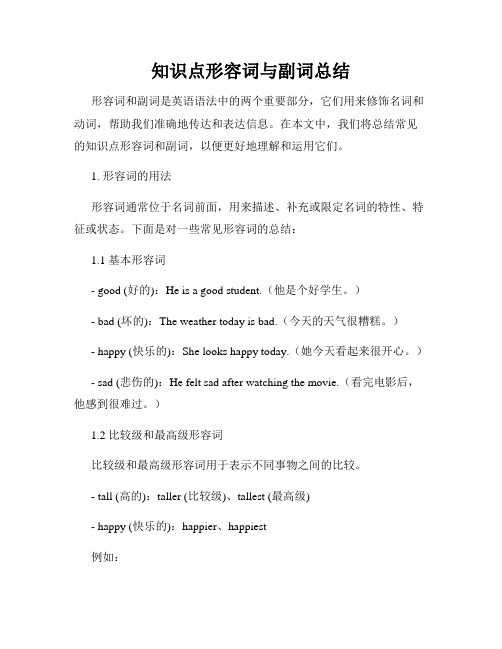
知识点形容词与副词总结形容词和副词是英语语法中的两个重要部分,它们用来修饰名词和动词,帮助我们准确地传达和表达信息。
在本文中,我们将总结常见的知识点形容词和副词,以便更好地理解和运用它们。
1. 形容词的用法形容词通常位于名词前面,用来描述、补充或限定名词的特性、特征或状态。
下面是对一些常见形容词的总结:1.1 基本形容词- good (好的):He is a good student.(他是个好学生。
)- bad (坏的):The weather today is bad.(今天的天气很糟糕。
)- happy (快乐的):She looks happy today.(她今天看起来很开心。
)- sad (悲伤的):He felt sad after watching the movie.(看完电影后,他感到很难过。
)1.2 比较级和最高级形容词比较级和最高级形容词用于表示不同事物之间的比较。
- tall (高的):taller (比较级)、tallest (最高级)- happy (快乐的):happier、happiest例如:- He is taller than his brother.(他比他的兄弟高。
)- She is the happiest person in the room.(她是房间里最快乐的人。
)1.3 泛指和特指形容词泛指形容词用于描述没有具体限制的事物,而特指形容词用于描述特定的事物。
- some (一些):He bought some apples.(他买了一些苹果。
)- this (这个):This book is interesting.(这本书很有趣。
)2. 副词的用法副词通常用来修饰动词、形容词或者其他副词,用来表达方式、时间、原因等。
2.1 副词修饰动词- slowly (慢慢地):He walks slowly.(他走得很慢。
)- quickly (快速地):She runs quickly.(她跑得很快。
中考英语语法:形容词和副词(2-副词)

形容词和副词(2-副词)●副词的构词:1)大部分形容词+ ly = 副词e.g.deep --> deeply ; loud --> loudly2)以y结尾的形容词,改y为i,+ ly = 副词e.g.happy --> happily ; easy --> easily3)以le结尾的形容词,去e,+ y = 副词e.g. possible --> possibly ; reliable --> reliably4)不规则变化e.g. good --> well ; bad --> worse5)有些副词和形容词同形初中考纲中有七个形容词和副词形式相同: ahead; early; fast; hard; high; late; straight The road ahead was blocked.I’ll run ahead.The early part of her life was spent in Paris.I get up early everyday.He is a fast learner.The water was rising fast.Diamonds are hard.You must try hard.I looked down from the high window.We should aim high and do our best to achieve our goal.She is late for work everyday.I got up late.He was too tired to walk straight.You look better with straight hair.●副词的用法副词在句中用作状语。
e.g.It's raining hard.Don’t drive too fast.This is a fairly useful tool.Luckily, he still got first prize.●副词的位置1)方式状态的副词(Adverbs of Manner)这一类副词是修饰动词专用的,典型拼法是形容词加上-ly。
二、形容词副词词讲解
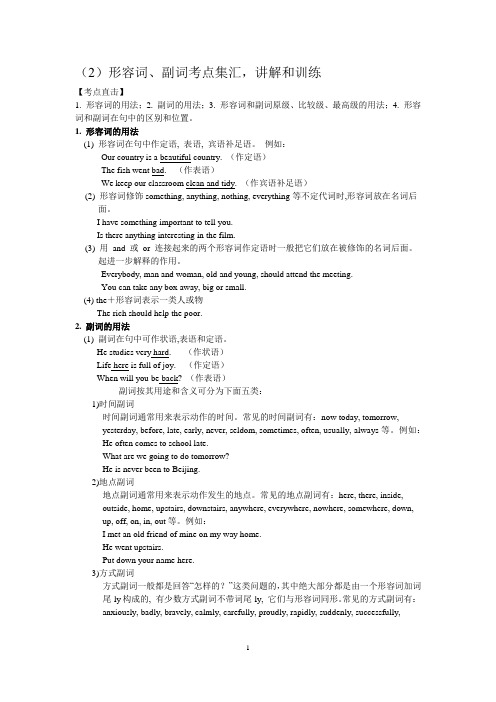
(2)形容词、副词考点集汇,讲解和训练【考点直击】1. 形容词的用法;2. 副词的用法;3. 形容词和副词原级、比较级、最高级的用法;4. 形容词和副词在句中的区别和位置。
1. 形容词的用法(1) 形容词在句中作定语, 表语, 宾语补足语。
例如:Our country is a beautiful country. (作定语)The fish went bad. (作表语)We keep our classroom clean and tidy. (作宾语补足语)(2) 形容词修饰something, anything, nothing, everything等不定代词时,形容词放在名词后面。
I have something important to tell you.Is there anything interesting in the film.(3) 用and 或or 连接起来的两个形容词作定语时一般把它们放在被修饰的名词后面。
起进一步解释的作用。
Everybody, man and woman, old and young, should attend the meeting.You can take any box away, big or small.(4) the+形容词表示一类人或物The rich should help the poor.2. 副词的用法(1) 副词在句中可作状语,表语和定语。
He studies very hard. (作状语)Life here is full of joy. (作定语)When will you be back? (作表语)副词按其用途和含义可分为下面五类:1)时间副词时间副词通常用来表示动作的时间。
常见的时间副词有:now today, tomorrow,yesterday, before, late, early, never, seldom, sometimes, often, usually, always等。
形容词和副词的英语语法讲解(2)
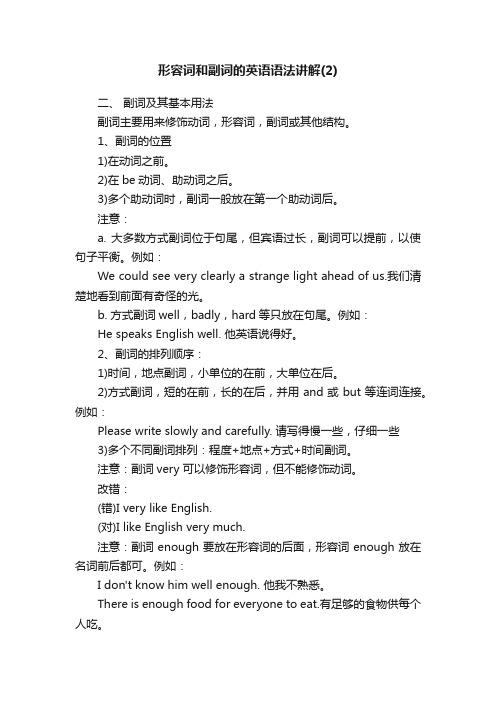
形容词和副词的英语语法讲解(2)二、副词及其基本用法副词主要用来修饰动词,形容词,副词或其他结构。
1、副词的位置1)在动词之前。
2)在be动词、助动词之后。
3)多个助动词时,副词一般放在第一个助动词后。
注意:a. 大多数方式副词位于句尾,但宾语过长,副词可以提前,以使句子平衡。
例如:We could see very clearly a strange light ahead of us.我们清楚地看到前面有奇怪的光。
b. 方式副词well,badly,hard等只放在句尾。
例如:He speaks English well. 他英语说得好。
2、副词的排列顺序:1)时间,地点副词,小单位的在前,大单位在后。
2)方式副词,短的在前,长的在后,并用and或but等连词连接。
例如:Please write slowly and carefully. 请写得慢一些,仔细一些3)多个不同副词排列:程度+地点+方式+时间副词。
注意:副词very 可以修饰形容词,但不能修饰动词。
改错:(错)I very like English.(对)I like English very much.注意:副词enough要放在形容词的后面,形容词enough放在名词前后都可。
例如:I don't know him well enough. 他我不熟悉。
There is enough food for everyone to eat.有足够的食物供每个人吃。
There is food enough for everyone to eat.3、兼有两种形式的副词1) close与closelyclose意思是"近";closely 意思是"仔细地"。
例如:He is sitting close to me. 他就坐在我边上。
Watch him closely. 盯着他。
2) late 与latelylate意思是"晚";lately 意思是"最近"。
形容词和副词的用法

形容词和副词的用法作用:1.形容词:(1)形容词在句中常修饰名词和代词。
A good boy。
Something important(2)形容词在句中作定语、表语、宾语补足语。
Our country is a beautiful country。
(作定语)The meal is delicious. (作表语)We keep our classroom clean and tidy。
(作宾语补足语)2.副词:(1)副词在句中修饰动词、副词、形容词、全句(Luckily)。
She speaks English well. Luckily,I passed the exam。
(2)副词在句中可作状语、表语、和定语。
He studies very hard. (作状语) When will you be back。
(作表语)注意:常用来修饰原级的词有:very,too, so,really, quite, pretty等一、位置1.形容词:通常要放在所修饰的名词之前,但要放在不定代词(something、anything…)之后。
2.副词:1)多数副词作状语时放在行为动词之后。
如果动词带宾语,则放在宾语之后。
Mr。
Smith works very hard. She speaks English well.2) 频度副词作状语时,通常放在行为动词之前,情态动词、be动词和助动词之后.He usually gets up early。
I am never late for school.3)程度副词一般放在所修饰的名词前面.He runs very fast.形容词和副词的比较级和最高级。
大多数形容词和副词有三个等级:原级、比较级、最高级.原级指形容词和副词的原形;比较级用来表示“较……"或“更……一些”;最高级则表示“最……”一、形容词和副词的原级:1.表示两者(A与B)在某一方面相同时用句型:A + 谓语+ as + 形容词或副词的原形+ as+ B.eg: ①Tom 和Sam 一样高。
形容词副词(下)
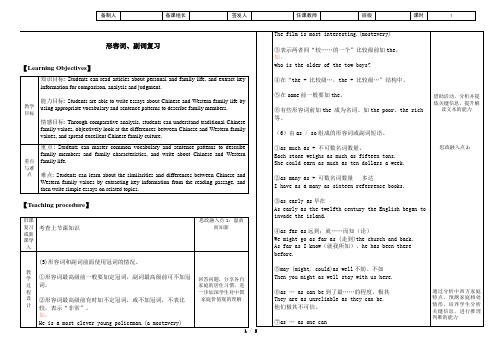
We were greatly shocked by the news about Tom. I was much amused by Jack’s attitude。
(C)已转化为形容词的现在分词前用very。如:very interesting / worrying / exicting。
(D)too前用much或far,不用very。You are much / far / a lot too nice.另外,在too many / much, too few / little前用far。
注意:
下列结构中只能用so不可用such,当名词前有many、much、little、few等表示“多、少”的词修饰时,如 so much progress、so many people、so little food、so few apples等。
但当little表示“小”时用such。如:These are such little boys that they can’t dress themselves.
【Teaching procedure】
旧课复习
或新课导入
考查上节课知识
思政融入点1:温故而知新
教
学
过
程
设
计
(5)形容词和副词前面使用冠词的情况。
①形容词最高级前一般要加定冠词,副词最高级前可不加冠词。
②形容词最高级前有时加不定冠词,或不加冠词,不表比较,表示“非常”。
如:
He is a most clever young policeman.(a most=very)
(6)由as / so组成的形容词或副词短语。
①as much as + 不可数名词数量。
英语(核心语法)之形容词与副词英语二轮复习语法专项之「形容词与副词」—知识网络
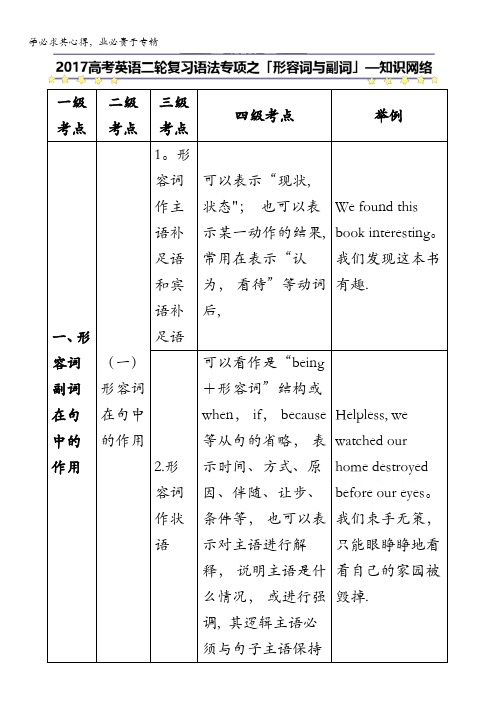
一级考点二级考点三级考点四级考点举例一、形容词副词在句中的作用(一)形容词在句中的作用1。
形容词作主语补足语和宾语补足语可以表示“现状,状态";也可以表示某一动作的结果,常用在表示“认为,看待”等动词后,We found thisbook interesting。
我们发现这本书有趣.2.形容词作状语可以看作是“being+形容词”结构或when,if,because等从句的省略,表示时间、方式、原因、伴随、让步、条件等,也可以表示对主语进行解释,说明主语是什么情况,或进行强调, 其逻辑主语必须与句子主语保持Helpless, wewatched ourhome destroyedbefore our eyes。
我们束手无策,只能眼睁睁地看着自己的家园被毁掉.的”;content “满意的”等。
一级考点二级考点三级考点四级考点举例形容词副词分类形容词分类2.复合形容词副词词干+分词hardworking 勤劳的名词词干+过去分词manmade人造的名词词干+现在分词timeconsuming 耗时的名词词干+形容词worldfamous 世界闻名的数词词干+名词ivestar 五星级的数词词干+名词-edthreelegged 三条腿的数词词干+名词+形容词fiveyearold 5岁的一级考点二级考点三级考点四级考点举例三、形容词副词的位置(一)形容词的位置1。
形容词后置修饰somebody,someone,something,anybody,anyone,anything,nobody,nothing等复合不定代词的形容词,则必须放在不定代词之后。
This isn’t anything important。
这并不是什么重要的东西。
形容词短语作定语必须We need a place twice larger than thisone.一级考点二级考点三级考点四级考点举例形容词副词的位置副词的位置2。
- 1、下载文档前请自行甄别文档内容的完整性,平台不提供额外的编辑、内容补充、找答案等附加服务。
- 2、"仅部分预览"的文档,不可在线预览部分如存在完整性等问题,可反馈申请退款(可完整预览的文档不适用该条件!)。
- 3、如文档侵犯您的权益,请联系客服反馈,我们会尽快为您处理(人工客服工作时间:9:00-18:30)。
形容词和副词1. 形容词的位置单个形容词修饰名词的时候,一般前置。
但是下列情况下形容词却要后置。
1)当形容词修饰由some,no,any,加上thing,body,one构成的复合代词时,总是后置。
【例如】I have something urgent to do, so I have to go now.There must be something wrong with him.2)以able或ible结尾的形容词与all, every, only或形容词最高级连用时,常常后置。
【例如】These are the best books available in the university library.Paris is one of the most beautiful cities imaginable.3)形容词词组常后置。
【例如】I know a girl good at singing.多个形容词修饰同一名词的顺序有几个形容词修饰同一名词时,词序无固定规律,一般的顺序为:1)限定词(冠词/代词/数词)→2)性质→3)大小/形状/新旧/年龄/颜色→4)名词性定语(包括动名词)→5)名词。
【例如】China is a great, modernized socialist country.Nancy is reading an old, exciting, romantic love story.Mary has just bought herself a pretty green cotton dress.My sister knew a tall intelligent young American professor whom she met in college.2. 作表语的形容词1)很多以a开头的形容词,如asleep, afraid, awake, alone, aware, alive, ablaze, alike等,一般只作表语。
【例如】He was so tired that he soon fell asleep.Whether he was alive or dead in the earthquake is still unknown.2) 这类形容词有时可以放在名词后作后置定语。
【例如】He is one of the persons alive after the flood.The old man was the only person awake at the moment.3) 这类形容词中有些像alike(相同),alone(单独),amiss(差别),afire(燃烧着),adrift(漂流),afloat(漂浮), afoot(徒步)等既是表语形容词,又是副词,它们的用法不同。
【例如】 The twins look so much alike that it is difficult to distinguish one from the other. My brother and I alike are funs of pop music.4)一些表示身体健康情况的形容词,如ill, well, unwell, fit, poorly等,一般作表语。
【例如】I don’t feel well, I need to go to see the doctor.How to keep fit is a popular topic these days副词1. 副词在句中的位置1)修饰形容词或副词时,通常放在前面。
2)当句子的谓语动词是行为动词时,频度副词一般放在谓语动词之前。
句中有be或助动词、情态动词时,放在其后。
【例如】I often go to the cinema on weekend with my husband.I can hardly understand him for what he said was really confusing.I have never been abroad until now.3)程度副词修饰形容词或副词,通常放在被修饰的形容词之前。
但是enough总是放在所修饰的形容词或副词之后。
【例如】The boy didn’t work hard enough.He is quite diligent. But his achievement is not good enough.4) only的位置比较灵活,修饰哪个词,就放在哪个词的前面,以示强调。
【例如】I only saw John yesterday. I didn’t see his wife.I have bought two kilos of potatoes only.Only in the afternoon, can you borrow books from the university library.5)only too pleased to do sth: 非常想干某事I only too pleased to go home.2). 副词的作用与构成副词用来修饰形容词、副词和动词。
大部分副词由“形容词+ly”构成,如:happy→happily, slow→slowly, wonderful→won derfully等。
但有些以ly结尾的词却不是形容词,而是副词,如:friendly, brotherly, likely, lonely等。
有些词可以作形容词也可以作副词,如:early, late, fast, hard, low, much, near 等。
3) fairly, quite, rather表示“十分,非常”。
fairly语气最弱,放在不定冠词之后;quite语气较强,放在不定冠词之前;rather语气最强,可放在不定冠词前后,也可放在比较级前和too之前。
【例如】This is a fairly interesting story. I want to tell it to my friends.You have made quite a few mistakes in you writing. (quite a few = many)The weather is rather colder today than I have expected. The student was rather too dull.4). 具有两种形式的副词英语中有的副词兼有两种形式:一种是与形容词同形;另一种是在该形容词后面加副词词缀ly构成。
这两种形式的副词在词义和用法上有一定的差异,有的甚至完全不同。
常见的这类副词有:firm稳固地firmly坚固地direct径直地directly恰好 flat平淡地flatly直截了当地short突然shortly不久even甚至evenly平均地clean完全地,径直地 cleanly清洁地,干净利索地clear隔开,不接触clearly清晰地,明显地close近closely紧密地,接近地easy安适地 easily容易地dead突然地,完全地deadly死一般地,非常fair公平,正直地fairly相当地 right还好,适当地rightly改正地,合理地,正确地 just正好justly 公正地 sharp突然地,急剧地sharply严厉地【例句】Don’t come too close. /I closely resemble my father.The train stopped dead./She turned deadly pale.She slipped right to the bottom of the icy mountain. / I am rightly informed.例1):Fix the post ____in the ground.A) firmed B) firmly C) firmly D) firm答案为D。
firmly意味“坚固地,顽固地”,在此句中不妥,firm意为“稳固地,牢固地”,合乎题意要求。
句意:把这个桩子牢固地钉在地上。
例2)Communism can never be taken as the equivalent of eating ____and riding____.A) free; free B) freely; freely C) free; freely D) freely; free答案为A。
free意为“免费地”,freely意为“自由自在地,不受约束地”。
句意:共产主义决不能理解为白吃饭和免费乘车。
例3)The desk was ___in the center of the room.A) direct B) directed C) directing D) directly答案为D。
题意:书桌刚好在屋子中央。
比较级1. 比较级的修饰词比较级可以用much, far, a lot, a great deal, a little, a bit, by far来修饰。
【例如】She is much more beautiful than I have thought.The situation is far more complicated than I have imagined.I can do a little better than you. Let me do it.2. 形容词、副词比较级1)比较的成分要对等。
【例如】He is more concerned about others than about himself. My father is in better health now than last year. The population of China is larger than that of America.2) the +比较级……,the +比较级……意为“越……,越……”。
前面部分是从句,后面部分是主句。
【例如】The harder you work, the more successful you will be.The earlier you come, the better place you can find3. 没有比较级的形容词和副词1)有些程度副词,如:quite, rather, comparatively, incomparably, relatively, fairly等与形容词连用具有“比较”含义。
